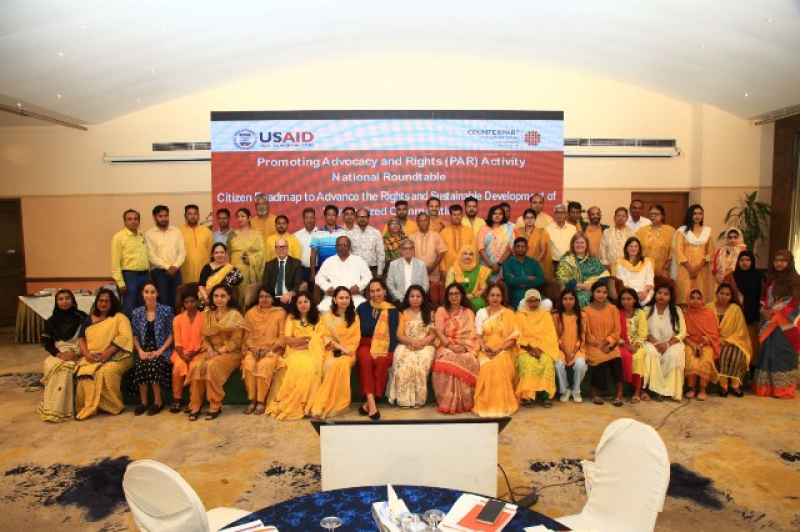- Janaza of six Bangladeshi peacekeepers held at Dhaka Cantonment |
- Bangladesh stock market loses Tk 10,500cr in a week |
- Dhaka’s air turns ‘very unhealthy’ on Sunday morning |
- Project to transform N’ganj into a climate-resilient green city |
- Sustainable, rights-based solutions to Rohingya crisis urged |
Roadmap aims to advance condition of Dalit, Cobbler communities

Roadmap aims to advance condition of Dalit, Cobbler communities
Dhaka, May 01 - Over 50 civil society leaders and activists, Dalit and Cobbler community leaders, former and current policymakers convened for a national roundtable discussion titled “Citizen Roadmap to Advance the Rights and Sustainable Development of Marginalized Communities.”
The event was held at Lakeshore Hotel in Dhaka on Tuesday.
At the discussion, young women leaders from the Dalit and Cobbler communities presented their recommendations for the roadmap to include enacting the anti-discrimination and minority rights acts, establishing a platform or caucus in parliament to advance minority rights, and expanding access to social safety net benefits and programs for marginalized communities.
Subsequently, policymakers shared their thoughts on how best to implement the roadmap recommendations.
Lawmaker MA Mannan, Chair of the Parliamentary Standing Committee on Ministry of Planning and lawmaker Mohibur Rahman Manik, Chair of Government Assurance Committee, both enthusiastically endorsed the initiative to develop the roadmaps and expressed their commitment to helping implement their recommendations.
In addition, Reed Aeschliman, USAID Mission Director, said, “USAID is proud to support organizations and citizens across the country, like you all, who are working to advance human rights, advocate for reforms, and build an accountable system of governance.”
“We strongly believe that good governance leads to greater prosperity. Upholding basic freedoms, fostering pluralistic dialogue and advocating for the rights of all people will help catalyze faster economic growth in Bangladesh. Because it is only when you have the inclusion of all members of society that they can actively contribute to the sustainable development of the nation,” he added.
Gwendolyn Appel, Counterpart International’s Vice President, also presented two organizations, Dalit and Gram Bikash Sohaok Songstha (GBSS), with Counterpart International’s inaugural Civic Champions Award in recognition of their work to support and expand the civic participation of the Dalit and Cobbler communities.
Katie Croake, Chief of Party, Counterpart International, closed the event saying, “Thank you all for your leadership in working together and providing an impressive model for collaboration between citizens and policymakers to improve peoples’ lives in marginalized communities.”
Ahead of the 2024 parliamentary election, Promoting Advocacy and Rights (PAR) supported its partners to mobilize 2,303 citizens in underrepresented communities to identify and share their priority issues and recommendations with 217 political leaders and 46 parliamentary candidates for inclusion in campaign manifestos and commitments, resulting in 263 pledges of support.
Following the election, PAR’s partners developed citizen-led advocacy roadmaps that reflect both the priority issues of marginalized communities and party manifesto commitments and campaign pledges.
Since 2018, the Promoting Advocacy and Rights (PAR) Activity, funded by USAID, and implemented by Counterpart International, has been supporting civil society organizations in Bangladesh to advocate for citizen-led priorities and strengthen civic participation.
Through active collaboration and partnerships between communities, government, civil society, and the private sector, PAR’s partners have successfully improved the lives of marginalized communities and contributed to sustainable development in Bangladesh.-UNB

